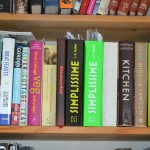Library
English for Librarianship
Context
I consider that my job is twofold in this course:
1. To develop your confidence in using the considerable amount of English you already possess – especially in an oral form.
2. To enable you to apply your English within subjects and contexts which you may well be likely to encounter within your chosen profession.
We will try to do this in an atmosphere of ‘informal professionalism’, that is to say that I will treat you as young professionals and that I expect you to accord me a similar privilege … (though as a bit older of a professional, I admit!!), and we will do this without suits and ties, but we will nevertheless be professional about it.
You should appreciate that speaking French isn’t the only pre-requisite of playing a part in French society: cultural appreciation is also a key. the same is true of English: it is not just a language, there is a culture too – and I will be trying (as a native English speaker (from Manchester) to get you to understand this too.
There is another compelling reason for reading, writing and especially speaking English – despite what France might like to prefer to think, English is very much the language of inter-cultural, international communication. Should you doubt this, look at the UHA’s MICAI Inter-cultural Management and International Business programme: the common working language required of ALL students is English. the same goes at ENSISA (The UHA Engineering School), the French Education Nationale insists that to become a certified French Engineer from any of its engineering schools, a graduate MUST be able to work worldwide and MUST therefore have a high level of English proficiency. Whether you agree or not – it is crucially important – perhaps especially so in the sharing of global research. The best scientists and researchers an any and all subjects need to be able to share their efforts, ideas and creativity – and that requires a common language and that, for the mostpart, happens to be English. For example, earlier in my career I led a pan-European Masters programme with seven or eight EU nations,(including: France, England, Sweden, Portugal, Spain, Germany, the Netherlands)….. we had ONE common course document (written in English and adopted in English by all the partner institutions) and when we met, wherever we met, our working language was English and our reporting to the EU was in English.
The words your books and documents contain (and you preserve, conserve, catalogue, organise and make available) only have value if they can be accessed read and understood widely. We do research because we want to move forward, advance, stimulate ideas and understanding. It would be criminal if this were to be barricaded behind walls of originating languages and all but invisible to the rest of the interested world who might be able to carry it on, carry it forward.. For the moment the principal language of global business and international sharing is English – largely as a function of the legacy of the British Empire (which was the largest and most recent empire the world has ever seen). In the future, according to statistical projections of languages developments, it could well become Chinese /Mandarin or perhaps Spanish. For the foreseeable future, however, English is, de facto, the language of international transfer, so you need to have a measure of confidence in the use of it as a non-specialist. No-one is going to expect you to translate articles from French into English for publication in high-ranking English language journals and reviews (I don’t want you to anway – that’s my nîche speciality!!), but what about:
- confirming a conference booking for your boss and organising a hotel booking in English?
- Showing someone English-speaking around your library/archive/documentation centre and explaining things to them knowing full well that you will be making mistakes in grammar and syntax but that you will still be thoroughly understood and that your interlocutor will be very grateful and impressed that you can do this?
You’ve all seen cowboy films with Clint Eastwood going into a bar. It is always called ‘The Last Chance Saloon’ (trust me – check it out in the next film you see!). Well… you are right in it!!! What do I mean by this? I’m guessing you have had maybe 10 years or so of English but that you are not nearly that confident about using your English – especially speaking it. Am I right? For 80% of you I bet I am. So you will understand that my first task is to get you over your reservations about speaking…. I want you to try, to launch out knowing you will make mistakes, but that this is OK. Your mistakes will not be held against you, rather your courage in trying will be because it helps me to help you! When you have left university you will have to pay 40 Euros and hour for further English lessons…. better you really make use of the almost ‘free’ English support here, no?
…And all this in just 16 hours!!
So what do I want of you?
- Take a risk because you want to learn – I’ll never penalise you for it – you are non-specialists – you are not doing and English degree!
- I just need you to be clear about what you mean in English.
- If you are of German background and happen to make me wait for the verb: no problem!
- If you make the odd tense error but things are clear anyway: no problem!
- If you are terribly French and you want to make adjectives agree with the gender of the noun they amplify (they don’t in English – because nouns don’t have genders allocated to them: no problem!)
- If your accent is very French (what I call: ‘Zis, Zat, Zese and Zose’), I can still understand you and your accent is so ‘cute’ to English ears so: no problem!
- If you make any of the odd ‘mistakes’, I might help you correct it/them, but I won’t be penalising you: I’ll be helping you – so NO PROBLEM!
So ‘Come on in – the water’s lovely!’
Just try and help me to help you without penalty….. Go on.. try it…. What have you got to lose?
Assessed Content
In this unit you will have TWO assignments (pieces of work to do).
ITEM N°1. Team/ Group. 40% of Unit Mark.
[NB. Although I will commence with a ‘base mark’ for the team/group, I reserve the right to moderate this up or down according to conspicuous performance (absence or evidence thereof). I always expect ALL members of a team/group to ‘pull their weight’ and to share the workload evenly and fairly.] This may be in the form of presentations, debates, workshops, managed discussions etc as directed by the tutor. These will be assigned to you and will usually be shown on the drop-down menu associated with this tab (onglet).
Submission Dates: To be advised.
The team / group topics are as follows:
T1. Plagiarism. See the ‘spring-out’ menu under my FLSH –> Library tab which is called T1.
T2. Reinventing libraries : a vision of the future. See the ‘spring-out’ menu under my FLSH –> Library tab which is called T2.
T3. The earliest Libraries and Archives. See the ‘spring-out’ menu under my FLSH –> Library tab which is called T3
ITEM N°2. Individual / Pair essay, report, ‘thinkpiece‘ or similar. 60% of Unit Mark.
You have a free choice as to which topic you will address from the list below. The form, however, will be specified in the question. You may do these in pairs or as an individual as you prefer. [No teams of three or more permitted – so don’t ask].
Q1. « 26 Soldiers of Lead ».
A printer who started work after WW2 and finished in the 1990s wrote upon his retirement (in print, obviously) of his experience of starting his professional life as a ‘comp‘ (Compositor – the person who put the lead type in a line ready for the machine to print: the ’26 soldiers of lead’) and finishing it with newspaper articles being conceived, written, designed, edited, paged, proofed, published and read online using digital technologies that circumvented the need to print. He called this: « The greatest change in printing since Gutenberg and Caxton ». [Aside: I received this first hand – this printer was my father whose family had been in the printing profession for generations.]
TO DO. Consider the above and identify all the stages in the evolution of print/publication from Caxton & Gutenberg to today, explaining the processes and their evolution at each stage. Produce this in the form of a REPORT.
Q2. ‘Then and Now’.
« In my ‘day’ – studying at university in the late 70s and 80s – the problem was identifying and getting access to a very limited number of hard copy resources without which one could not ‘attack’ the assignments set by our lecturers. Today’s university student generation faces a very different problem, practically the inverse in fact: almost unlimited resources and millions of search returns where the very best material (the ‘needles’) is often obscured completely by a gigantic mass of unreliable and unhelpful sources (the ‘haystack’). Today, finding the proverbial ‘needle in the haystack’ is exceptionally difficult – how does one tell what is valid and reliable and what isn’t? For example, a search for the term: ‘Library Studies Definition’ produced 125,000,000 returns in less than 0.067 of a second! ».
TO DO. In REPORT Form. Write an instruction for future students which will enable them to find the ‘needle in the haystack’ and be sure that it has validity and reliability.
Q3. Print is: ‘Not going gently into that good night’ (Dylan Thomas).
‘With the internet, mobile phones, tablets, PCs and e-book readers we have been able to access and read newspapers and books online for some 20 or more years. BUT… we are still printing books on paper like there is no tomorrow and we still print hundreds of thousands of newspapers every day in France (even though they are also available now online). Many forecast that ‘Print is Dead!’, but it seems to be a remarkable resilient medium – after some 500 years or more it is not giving up the fight easily.’
TO DO. In ESSAY form. Discuss the above, and what might be behind the apparent resilience of the printed form even when faced with the explosion of digital technologies and attempt to forecast (with supporting evidence) the future of the printed medium. To get you started, Gail Rebuck’s article on the subject: ‘The Curious Incident of the Book in the Digital Age’ might help….


